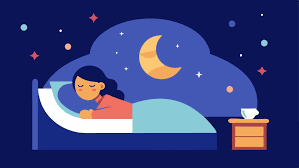
In the fast-paced world we live in, sleep is often seen as a luxury rather than a necessity. Yet, emerging research from psychology, neuroscience, and medicine continues to affirm one vital truth: good sleep hygiene is essential for mental well-being. Without it, no amount of caffeine, meditation apps, or productivity hacks can truly compensate. Let’s take a deeper dive into how sleep hygiene—small habits around sleep—can have a monumental impact on our mental health, and how simple, science-backed practices can help us harness the restorative magic of sleep.
Understanding Sleep Hygiene
Sleep hygiene refers to the behaviors, environment, and routines that help promote consistent, uninterrupted, and restful sleep. It's not just about getting eight hours—it's about ensuring the quality of those hours supports your body’s natural rhythms and needs. Poor sleep hygiene can contribute to:
1. Increased Risk of Depression and Anxiety
2. Reduced Cognitive Function (memory, attention, decision-making)
3. Emotional Instability
4. Physical Health Problems (like weakened immunity and cardiovascular issues)
Good sleep hygiene, on the other hand, enhances emotional resilience, sharpens the mind, stabilizes mood, and boosts overall energy.
The Circadian Rhythm: Your Body’s Internal Clock
At the core of sleep hygiene is the circadian rhythm—a roughly 24-hour cycle that governs not just sleep, but digestion, hormone release, and body temperature. The circadian rhythm is like an internal conductor, orchestrating when we feel alert and when we feel sleepy. Disruptions to this rhythm (such as irregular sleep times, night shifts, or excessive screen use at night) confuse the body, making restorative sleep much harder to achieve. Keeping a regular sleep-wake schedule—going to bed and waking up at the same times every day, even on weekends—helps keep the circadian rhythm steady. A steady rhythm, in turn, supports better mood regulation, sharper thinking, and even reduced risks of serious mental illnesses like bipolar disorder or major depression.
Bright Light: The Natural Signal to Wake Up
One simple yet powerful tool for aligning your circadian rhythm is exposure to bright light soon after waking up. Morning light, especially natural sunlight, is a strong "zeitgeber" (German for "time giver") that tells the brain: It's time to be awake and alert. Sunlight signals the suppression of melatonin (the sleep hormone) and triggers a cascade of biological processes that promote wakefulness, focus, and a positive mood.
Tips for Using Morning Light Effectively:
Step outside within 30–60 minutes of waking, even if it's cloudy. Natural light is still much more powerful than indoor lighting. Spend at least 10–30 minutes outdoors or by a bright window. Avoid sunglasses during this exposure (unless medically necessary) to maximize the light signal. Conversely, minimizing bright artificial light exposure at night (especially blue light from screens) is crucial for allowing melatonin to rise naturally, preparing you for sleep.
Other Key Components of Sleep Hygiene
Beyond light and regularity, other practices make a huge difference:
1. Create a Wind-Down Routine Establish calming pre-sleep habits like reading, stretching, or deep breathing. This signals to your brain that it's time to shift from alertness to relaxation.
2. Optimize Your Sleep Environment Keep your bedroom cool (around 65°F or 18°C is ideal for most people). Eliminate or minimize noise and light Use your bed only for sleep and intimacy—this strengthens the mental association between bed and rest.
3. Be Mindful of Substances Caffeine, alcohol, and heavy meals too close to bedtime can all disrupt sleep quality. Aim to avoid caffeine at least 6 hours before bed, and limit alcohol, which can fragment sleep even if it initially makes you drowsy.
4. Limit Naps (or Nap Smartly) While short naps (under 30 minutes) can be beneficial, frequent long naps can confuse your sleep-wake cycle and make nighttime sleep more difficult.
The Mental Health Payoff
Prioritizing sleep hygiene isn’t just about avoiding grogginess—it's a potent form of self-care. When sleep is optimized: The brain processes emotional memories more efficiently. Anxiety levels decrease, problem-solving and creativity flourish, and overall resilience to stress improves. In fact, many evidence-based treatments for mood disorders, such as Cognitive Behavioral Therapy for Insomnia (CBT-I), begin with improving sleep habits.
Final Thoughts
Sleep hygiene is a low-cost, highly effective way to boost mental health, cognitive performance, and emotional balance. By respecting your body’s natural rhythms, welcoming bright light in the morning, creating a soothing sleep environment, and sticking to consistent routines, you empower your brain and body to operate at their best. Good sleep isn't just rest—it's medicine, renewal, and a foundation for thriving.
Tonight, give yourself the gift of intentional sleep. Your future self will thank you.

Elizabeth Bennett
Contact Me


